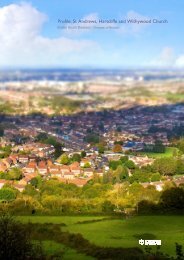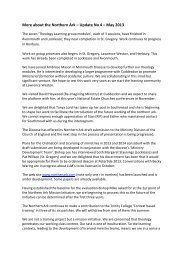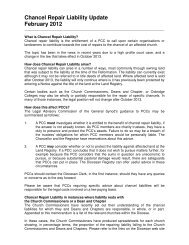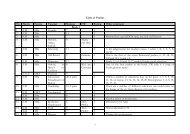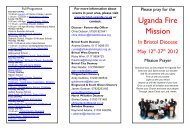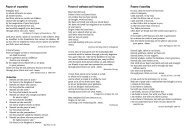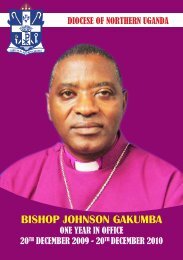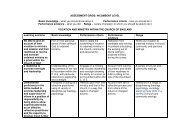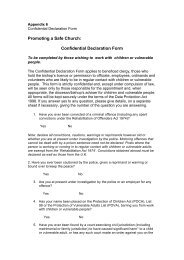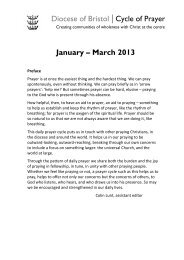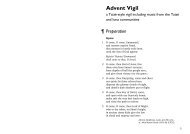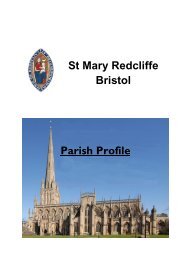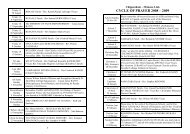Hearing Gods Call Discernment - Diocese of Bristol
Hearing Gods Call Discernment - Diocese of Bristol
Hearing Gods Call Discernment - Diocese of Bristol
Create successful ePaper yourself
Turn your PDF publications into a flip-book with our unique Google optimized e-Paper software.
<strong>Hearing</strong> God’s <strong>Call</strong><br />
Diocesan <strong>Discernment</strong> Days<br />
For more information, contact the Advisers for Licensed Ministry:<br />
Revd Sam Rushton<br />
Church House<br />
23 Great George Street<br />
BRISTOL<br />
BS1 5QZ<br />
sam.rushton@bristoldiocese.org<br />
0117 906 0100 or<br />
01249 660 451<br />
<strong>Diocese</strong> <strong>of</strong> <strong>Bristol</strong> | Ministry Development<br />
Vocation, <strong>Discernment</strong> and Selection<br />
in the <strong>Bristol</strong> <strong>Diocese</strong><br />
August 2011<br />
Church House, 23 Great George Street, <strong>Bristol</strong>, BS1 5QZ<br />
0117 906 0100 | www.bristol.anglican.org |<br />
Revd Canon Ray Brazier<br />
51 Chalks Road<br />
St. George<br />
<strong>Bristol</strong><br />
BS5 9EP<br />
rayvb@tiscali.co.uk<br />
0117 329 4611<br />
The <strong>Bristol</strong> Diocesan Board <strong>of</strong> Finance Limited | Reg. in England: Charity 248502, Company 156243<br />
August 2011
What is the purpose <strong>of</strong> the Diocesan <strong>Discernment</strong> Day?<br />
The aim <strong>of</strong> the day is to help potential candidates for authorised ministries in the <strong>Bristol</strong> <strong>Diocese</strong><br />
discern their vocation. The Bishops have chosen a group <strong>of</strong> experienced lay and ordained ministers<br />
to help candidates discern, collaboratively and guided by the Holy Spirit:<br />
• the nature <strong>of</strong> their call, whether to lay or ordained ministry;<br />
• whether their call is obedient, informed, and realistic;<br />
• whether they have the skills and gifts to enable them to exercise their ministry in the place to<br />
which they have been called and for the task that the local church has allotted them;<br />
• and, if called to ordained ministry, whether their call is sufficiently developed to encourage<br />
them to present themselves for national selection at a Bishop’s Advisory Panel (BAP).<br />
How does the Diocesan <strong>Discernment</strong> Day relate to Diocesan strategy and<br />
to the rest <strong>of</strong> the ‘<strong>Hearing</strong> God’s <strong>Call</strong>’ programme?<br />
The purpose and structure <strong>of</strong> the Day is designed to reflect key elements <strong>of</strong> the Diocesan strategy:<br />
• It puts God, in the person <strong>of</strong> the Holy Spirit, at the heart <strong>of</strong> our discernment.<br />
• It is collaborative: candidates are allocated to groups <strong>of</strong> up to 8 people who together<br />
undertake a group exercise, testing presentation, facilitation and small group work skills, and<br />
who provide support and encouragement to each other during the Day; and the Diocesan<br />
Vocation Advisers work in teams <strong>of</strong> 3 to help each group <strong>of</strong> candidates discern their vocation.<br />
• It encourages people called to different roles in the church and on the edge <strong>of</strong> church, lay and<br />
ordained, mission-oriented and ministry-oriented, to test their call against a set <strong>of</strong> common<br />
criteria but recognising and affirming difference where appropriate.<br />
• It emphasises the leadership qualities required in today’s church.<br />
• It provides a clear process for discernment which can be understood by all - candidates,<br />
their incumbents, Advisers and other supporters <strong>of</strong> the process – which is owned by all, and<br />
which makes the best use <strong>of</strong> available resource.<br />
Candidates are encouraged to attend a <strong>Discernment</strong> Day as part <strong>of</strong> the Exploration phase <strong>of</strong> the<br />
‘<strong>Hearing</strong> God’s <strong>Call</strong>’ programme. Those who feel called to licensed lay ministry and who are<br />
undertaking the Exploring Christianity course 1 will normally attend the Day during their first year or<br />
early in the second year <strong>of</strong> the course. Those who feel they may have a call to ordained ministry are<br />
encouraged to meet with an Adviser for Licensed Ministry who may suggest deferring attendance at<br />
a <strong>Discernment</strong> Day until after attending the ‘Am I <strong>Call</strong>ed to be Ordained?’ course.<br />
How do I apply for the <strong>Discernment</strong> Day?<br />
Candidates should talk through their application for the <strong>Discernment</strong> Day with their Incumbent before<br />
applying. They may also feel it appropriate to discuss it with their Exploring Christianity 2 tutor or with<br />
the Adviser for Licensed Ministry. An application form for the <strong>Discernment</strong> Day is attached in the<br />
Appendices. Candidates who have not registered for the ‘<strong>Hearing</strong> God’s <strong>Call</strong>’ programme should<br />
also complete the registration form in the Appendices.<br />
How regularly are <strong>Discernment</strong> Days held?<br />
We aim to hold two Days each year, one in March and again in October.<br />
1 Or EGP course (EGP is the course which is being replaced by Exploring Christianity in 2010)<br />
2 or EGP tutor<br />
August 2011
What is the output from the Diocesan <strong>Discernment</strong> Day?<br />
The role <strong>of</strong> the Day is advisory; the Diocesan Vocation Advisers, supported by a Team Secretary,<br />
will:<br />
• advise the candidates, affirming their call or perhaps suggesting to them ways in which they<br />
still need to develop in order to achieve their aspirations;<br />
• advise the Sponsoring Bishop (+Lee) so that he can make the appropriate decision as to<br />
whether to license the candidate as a Licensed Lay Minister (LLM) or to allow a candidate for<br />
ordained ministry to go forward to a national selection conference (Bishops’ Advisory Panel or<br />
BAP 3 ).<br />
The primary output from the Day is a report on each candidate, written on behalf <strong>of</strong> the Advisers by<br />
the Team Secretary, which details the evidence for each criterion as collated by the Advisers and<br />
their advice and encouragement for each candidate. It also contains one <strong>of</strong> the following<br />
recommendations to the Sponsoring Bishop: the candidate:<br />
• should be licensed as a Licensed Lay Minister on the successful conclusion <strong>of</strong> their training;<br />
• should go forward to a national selection conference (BAP) within 6 months, sponsored as a:<br />
1. candidate with potential to achieve incumbent status (ie they have the potential to one<br />
day lead a church or be a lead chaplain; may be paid or self-supporting ministry)<br />
2. candidate with potential to achieve assistant minister status (self-supporting ministry)<br />
3. candidate for ordained local ministry.<br />
• should continue to pursue a call to ordained ministry but should delay going to a BAP while<br />
they continue to work on some aspect <strong>of</strong> their formation;<br />
• is not recommended for authorised ministry at this stage but should continue to pursue God’s<br />
call on their life in some other role as appropriate.<br />
In addition to the above, Advisers may make certain recommendations to the candidate to enable<br />
them to pursue their call more effectively. Suggested areas for development may include, for<br />
example, advice to candidates to:<br />
• deepen their spiritual lives;<br />
• undertake a further period <strong>of</strong> study to develop a particular gift eg an evangelism course, more<br />
theological study etc.;<br />
• become engaged in some form <strong>of</strong> mission activity, at home or abroad;<br />
• or to gain more experience <strong>of</strong> ministry in the Church <strong>of</strong> England, through a placement or<br />
becoming more engaged in the ministry and/or leadership <strong>of</strong> their own church.<br />
What criteria will be used to help candidates discern their vocation?<br />
Candidates for both ordained and lay ministry will be assessed against a common set <strong>of</strong> criteria<br />
based on the national selection criteria for ordained ministry. Selection in the Church <strong>of</strong> England<br />
today is very much ‘criteria-based’ - Vocation Advisers locally and at a national level are looking for<br />
evidence that candidates satisfy criteria under nine headings (see Appendix A). In this <strong>Diocese</strong> we<br />
have chosen to use the same nine headings for all candidates for authorised ministry, reflecting the<br />
increasing requirement for lay and ordained ministers to work alongside each other in collaborative<br />
teams and for all ministers to take increasing responsibility for leadership <strong>of</strong> their local church and/or<br />
missional communities. However although the basic criteria are the same for all, the substance <strong>of</strong><br />
3 BAP Advisers will make the definitive recommendation to +Lee as to whether the candidate may go forward into training and it is he who<br />
will then make the final decision.<br />
August 2011
the criteria vary according to the kind <strong>of</strong> ministry to which the candidate is called. As a general rule,<br />
the more autonomous the ministry (ie the more remotely the minister works from a ‘supervisor’), the<br />
higher the standard the candidate is expected to achieve in each criterion. The most ‘supervised’<br />
ministries will tend to be Licensed Lay Ministers (LLM) and Ordained Local Ministers (OLM) who will<br />
generally be ministering with the close guidance <strong>of</strong> an incumbent; the least supervised ministries will<br />
be potential incumbents and particularly Ordained Pioneer Ministers who will <strong>of</strong>ten be exercising their<br />
ministry outside the normal structures <strong>of</strong> the Church <strong>of</strong> England.<br />
All candidates will complete the same paperwork leading up to the Day, indicating in their application<br />
form which ministry they feel called to. The Vocation Advisers will assess them against the criteria<br />
appropriate to that ministry – see Appendix attached. However it may be that during the Day<br />
Advisers may become aware that a candidate is not best suited to the ministry indicated on their<br />
form; in this case, Advisers will also be looking for evidence that the candidate fulfils the criteria in the<br />
category they believe the candidate may be called to. The team <strong>of</strong> Advisers will then make a<br />
collective decision at the end <strong>of</strong> the Day as to which ministry they believe the candidate may be being<br />
called and will detail their reasons under the criteria headings for their advice.<br />
What evidence will Vocation Advisers use to help candidates discern their<br />
vocation?<br />
The evidence used by the Advisers falls into two categories: written evidence which they will receive<br />
two weeks before the Day, and experiential evidence gathered during the Day, including evidence<br />
from the group discussion, interviews and pastoral exercise.<br />
1 Written Evidence<br />
Candidates will be asked to provide the following:<br />
• an application form;<br />
• 4 references – an Incumbent’s reference, a reference from a lay person in the candidate’s<br />
church, an employer’s reference and an educational reference;<br />
• a parish pr<strong>of</strong>ile / job description (for LLM and OLM candidates);<br />
Candidates for ordained ministry will also be supported by copies <strong>of</strong> the assignments they produce<br />
as part <strong>of</strong> the ‘Am I <strong>Call</strong>ed to be Ordained?’ course.<br />
2. Evidence from the <strong>Discernment</strong> Day 4 :<br />
a The Presentation and Group Discussion<br />
On the <strong>Discernment</strong> Day, the candidates will be placed into groups <strong>of</strong> up to 8 people. In those<br />
groups, each candidate will be asked to:<br />
• make a 5 minute presentation on a topic <strong>of</strong> their choice but which relates directly to one<br />
<strong>of</strong> the nine criteria;<br />
• to facilitate a group discussion for 8 minutes on that topic;<br />
• and to summarise the discussion.<br />
Advisers will observe each candidate from three perspectives during this exercise: as a<br />
presenter, as a group facilitator, and as a group member.<br />
They will observe both style and content <strong>of</strong> candidates’ contributions, looking for both how<br />
candidates fulfil each <strong>of</strong> these roles (were they collaborative, inclusive, engaging, were they clear,<br />
4 For guidance on how to approach the <strong>Discernment</strong> Day, see the ‘Notes to Candidates’ in the Appendices<br />
August 2011
coherent, concise etc) and also what they contribute (did they understand the task, did they<br />
progress the task through adding knowledge or making connections, etc).<br />
Evidence will be collected during this exercise primarily under the criteria headings:<br />
• Personality and Character<br />
• Relationships<br />
• Leadership and Collaboration<br />
• Quality <strong>of</strong> Mind<br />
Although these criteria are the primary focus <strong>of</strong> this exercise, the content <strong>of</strong> the discussions may<br />
speak to other criteria, eg Faith, their understanding <strong>of</strong> the nature <strong>of</strong> Mission or Ministry in the<br />
Church <strong>of</strong> England. These observations will be noted by the Advisers.<br />
b. The Interview<br />
Normally candidates will be interviewed by two <strong>of</strong> the Advisers allocated to their group for 30<br />
minutes each. The Advisers will focus primarily on those criteria which cannot be readily<br />
assessed in a group situation<br />
• Vocation<br />
• Spirituality<br />
• Faith<br />
• some aspects <strong>of</strong> Personality and Character<br />
• Quality <strong>of</strong> Relationships<br />
However Advisers may press the candidate on any criteria where they require more evidence or<br />
wish to clarify the evidence they have been given. For example, if the candidate has expressed<br />
an opinion during the group exercise which is controversial or poorly thought through, they might<br />
wish to question that opinion or statement, testing their Quality <strong>of</strong> Mind.<br />
c. The Pastoral Exercise 5<br />
During the afternoon, the candidates will be given a pastoral situation to which they will be asked<br />
to respond with a piece <strong>of</strong> written work. Advisers will be looking for evidence that the candidate<br />
can<br />
• understand and respond to a complex human situation in a timely fashion<br />
• show an appropriate pastoral response<br />
• communicate in writing in terms appropriate to the context<br />
How will the Advisers use the evidence gathered during the <strong>Discernment</strong><br />
Day to help candidates discern their vocation?<br />
Once the candidates have left the <strong>Discernment</strong> Day, the Advisers will meet in their groups to collate<br />
the information they have gathered and come to a recommendation. The Team Secretary will take<br />
notes during this meeting in order to write up the candidates’ Reports. A copy <strong>of</strong> the Report will be<br />
sent, with a recommendation for action, to Bishop Lee and to each candidate within two weeks <strong>of</strong> the<br />
5 An example Pastoral Exercise is included in the Appendices in the Notes for Candidates<br />
August 2011
<strong>Discernment</strong> Day. A copy may also be sent to the candidate’s Incumbent to enable him/her to<br />
support the candidate in acting on the advice contained within the Report 6 .<br />
Where can I find more information on the <strong>Discernment</strong> Day?<br />
The Advisers for Licensed Ministry listed on the front <strong>of</strong> this paper are always happy to answer<br />
questions regarding any aspect <strong>of</strong> this process. Additional advice for getting the most out <strong>of</strong> this Day<br />
is to found in the Appendices.<br />
6 Candidates who do not want a copy <strong>of</strong> the report sent to their Incumbent should notify the Adviser for Licensed Ministry in writing before<br />
the <strong>Discernment</strong> Day.<br />
August 2011
Appendices<br />
Appendix A: Summary <strong>of</strong> Licensed Ministries in the <strong>Bristol</strong> <strong>Diocese</strong><br />
Appendix B: Criteria for Selection for all Licensed Ministries<br />
Appendix C: Recommended Reading for those exploring their vocation<br />
Appendix D: Application form for Diocesan <strong>Discernment</strong> Day (Parts 1-6)<br />
Appendix E: How to survive A Diocesan <strong>Discernment</strong> Day – notes for candidates<br />
from ‘A Well Wisher’<br />
Page 7 18/10/2011
Page 8 18/10/2011
Appendix A: A Summary <strong>of</strong> Licensed Ministries in the <strong>Bristol</strong> <strong>Diocese</strong><br />
Ministries currently licensed at Diocesan level comprise:<br />
• Ordained Minister with the potential to become an Incumbent or Incumbent Status (ISM)<br />
• Ordained Assistant Minister (AM)<br />
• Ordained Pioneer Ministry (OPM)<br />
• Ordained Local Ministry (OLM)<br />
• Licensed Lay Ministry (LLM)<br />
Other ministries may be recognised and commissioned at a deanery or parish level, eg Evangelist,<br />
Pastoral Care Assistant, Youth Worker, Worship Leader, etc.<br />
Policy statements regarding authorised ministries in the <strong>Bristol</strong> <strong>Diocese</strong> are available from the<br />
Adviser for Licensed Ministry on request. In summary:<br />
ISM • Age range at ordination normally 23 – 50<br />
• Normal preparation time prior to starting training: 1 – 2 years<br />
• Training period<br />
o two years full time (or three years part-time) at college if over 33 (three<br />
years if under 33), then<br />
o three – four years in a full time curacy at a parish which is not the ‘sending<br />
parish’<br />
• National Selection Criteria apply, however, this <strong>Diocese</strong> places particular emphasis<br />
on the candidate’s ability to lead people in mission<br />
• Candidates may be either stipendiary or non-stipendiary (ie paid or self-supporting)<br />
AM • Age range at ordination normally 23 – 55<br />
• Normal preparation time prior to starting training: 1 – 2 years<br />
• Training period<br />
o three years part-time on a course if over 33 (four years if under 33), then<br />
o four years in a part-time curacy at a parish which is usually not the ‘sending<br />
parish’<br />
• National Selection Criteria apply, however, this <strong>Diocese</strong> places particular emphasis<br />
on the candidate’s ability to lead people in mission.<br />
• Candidates will normally be non-stipendiary (ie self-supporting)<br />
Page 9 18/10/2011
OPM • Category reserved for exceptional, entrepreneurial candidates who have already<br />
set up and are leading a Fresh Expression <strong>of</strong> church but who also have the<br />
capability to undertake a more traditional pastoral, liturgical and sacramental role.<br />
Significant ability to reflect theologically on today’s culture will be required.<br />
• Age range at ordination normally 23 – 50<br />
• Normal preparation time prior to starting training: 1 – 2 years<br />
• Training period to be undertaken usually whilst maintaining an existing Fresh<br />
Expression<br />
o two years at college if over 33 (three years if under 33), then<br />
o three – four years in a full time curacy, at least 75% <strong>of</strong> which is spent<br />
leading a ‘Fresh Expression’ , but will also be required to fulfil standard<br />
training requirements <strong>of</strong> an Anglican curate.<br />
OLM • Age range at ordination normally 55 – 70<br />
• Normal preparation time prior to starting training: 1 year<br />
• Training period<br />
o three years part-time at Trinity College (may be reduced if candidates have<br />
prior theological learning or lay ministry experience)<br />
• three years in a curacy at their sending parish<br />
• OLMs must be:<br />
o able to satisfy the national criteria for ordained local ministry, judged by a<br />
national selection conference<br />
o settled in their community and unlikely to move to a new parish<br />
o exercising an existing ministry in their church which is recognised and<br />
affirmed by the local church<br />
o able to define with their parish an ordained role which is likely to be an<br />
extension <strong>of</strong> their existing ministry<br />
o part <strong>of</strong> a collaborative mission-oriented ministry team in their local context<br />
LLM • Age range at licensing normally 18 – 70<br />
• Training period<br />
o 2 years part-time on Exploring Christianity plus a further year <strong>of</strong> vocational<br />
training 7 ; or<br />
o 2 years part-time on a specially designed course run by Trinity College<br />
• LLMs must be able to satisfy national criteria for selection as amended by <strong>Bristol</strong><br />
<strong>Diocese</strong> to take into account the higher degree <strong>of</strong> supervision in ministry pertaining<br />
to this category. Candidates will normally attend a Diocesan <strong>Discernment</strong> Day to<br />
confirm their calling.<br />
• In <strong>Bristol</strong> <strong>Diocese</strong> LLMs will not normally be permitted to pursue a calling to<br />
ordained ministry within 3 years <strong>of</strong> being licensed. (This stipulation applies to all<br />
those licensed after February 2008)<br />
7 or for 2010/2011 only, two years training on the EGP course plus attendance at the Pastoral care course<br />
Page 10 18/10/2011
Appendix B: Summary <strong>of</strong> the Criteria for Selection<br />
Criterion A: Vocation<br />
Candidates should be able to articulate a sense <strong>of</strong> vocation to the ordained ministry and reflect on the effect <strong>of</strong> this<br />
on their life. They should be able to speak <strong>of</strong> the development <strong>of</strong> their inner conviction and the extent to which others<br />
have confirmed it. They should be able to show an understanding <strong>of</strong> what it means to be a deacon or a priest. Their<br />
sense <strong>of</strong> vocation should be obedient, realistic and informed.<br />
Criterion B: Ministry within the Church <strong>of</strong> England<br />
Candidates should show an understanding <strong>of</strong> their own tradition within the Church <strong>of</strong> England, an awareness <strong>of</strong> the<br />
diversity <strong>of</strong> traditions and practice, and a commitment to learn from and work generously with difference. They should<br />
be able to speak <strong>of</strong> the distinctiveness <strong>of</strong> ordained ministry within the Church <strong>of</strong> England and <strong>of</strong> what it means to<br />
exercise public ministry. They should be able to reflect on changes in contemporary society and the implications <strong>of</strong><br />
this for ministry and the Church.<br />
Criterion C: Spirituality<br />
Candidates should show evidence <strong>of</strong> a commitment to a spiritual discipline, which involves individual and corporate<br />
prayer and worship. They should be committed to a developing pattern <strong>of</strong> disciplined prayer, Bible study and the<br />
regular receiving <strong>of</strong> Holy Communion. They should be able to show how they discern God’s activity in their life, how<br />
their spiritual practice may have changed over time and how it is changing them. They should be able to reflect on<br />
how engagement with the world and others both affects, and is affected by, their practice <strong>of</strong> prayer. Their spiritual<br />
practice should be able to sustain and energise them in daily life and future ministry.<br />
Criterion D: Personality and Character<br />
Candidates should be sufficiently self-aware, mature and stable to show that they are able to sustain the demanding<br />
role <strong>of</strong> an ordained minister. They should be able to demonstrate how they have faced change and pressure in a<br />
balanced and flexible way and how they manage stress. Candidates should be seen to be people <strong>of</strong> integrity who can<br />
generate trust and display honesty. They should be able to speak <strong>of</strong> how they have coped with difficult life<br />
experiences, how they have reflected upon them and incorporated them within their life and understanding.<br />
Criterion E: Relationships<br />
Candidates should show the capacity to build healthy personal, pr<strong>of</strong>essional, and pastoral relationships. They should<br />
demonstrate an awareness <strong>of</strong> the need for, and ability to establish and sustain, appropriate boundaries between<br />
personal and pr<strong>of</strong>essional life and within pastoral relationships. They should be able to manage conflict and show an<br />
ability to negotiate difficult relationships. Candidates should demonstrate good interpersonal skills, the willingness to<br />
learn from experience, and a commitment to building inclusive relationships within diversity. They should show the<br />
potential to exercise effective pastoral care. Candidates must be willing to live within the discipline <strong>of</strong> Issues in<br />
Human Sexuality.<br />
Criterion F: Leadership and Collaboration<br />
Candidates should demonstrate an ability to <strong>of</strong>fer leadership in the Church community and in the wider community as<br />
appropriate. This ability includes the capacity to <strong>of</strong>fer an example <strong>of</strong> faith and discipleship which is inspiring to others<br />
and witnesses to the servanthood <strong>of</strong> Christ. They should show a commitment to identifying and nurturing the gifts <strong>of</strong><br />
others and be able to collaborate effectively. Candidates should be able to identify their own leadership style, and<br />
reflect on the strengths and weaknesses <strong>of</strong> this and <strong>of</strong> the different ways in which leadership may be exercised within<br />
the Church. They should be able to be flexible and adaptable in leadership and demonstrate ability to guide and<br />
shape the life <strong>of</strong> the Church community in its mission to the world.<br />
Criterion G: Faith<br />
Candidates should show an understanding <strong>of</strong> the Christian faith and a desire to deepen their understanding. They<br />
should demonstrate a personal commitment to Christ and a mature, robust faith which shapes their life and work.<br />
Candidates should show an ability to reflect critically on their faith and make connections between faith and<br />
contemporary life. They should demonstrate a capacity to communicate their faith engagingly and effectively.<br />
Criterion H: Mission and Evangelism<br />
Candidates should demonstrate a personal commitment to mission that is reflected in thought, prayer and action.<br />
They should show a wide and inclusive understanding <strong>of</strong> mission and the strategic issues and opportunities within<br />
contemporary culture. Candidates should be able to articulate the good news <strong>of</strong> the Kingdom appropriately in<br />
differing contexts and speak <strong>of</strong> Jesus Christ in a way that is exciting, accessible, and attractive. They should enable<br />
others to develop their vocations as witnesses <strong>of</strong> the good news. They should show potential as leaders <strong>of</strong> mission.<br />
Criterion I: Quality <strong>of</strong> Mind<br />
Candidates should have the necessary intellectual capacity and quality <strong>of</strong> mind to undertake satisfactorily a course <strong>of</strong><br />
theological study and ministerial preparation and to cope with the intellectual demands <strong>of</strong> ministry. They should<br />
demonstrate a desire to learn through the integration <strong>of</strong> academic study and reflection on experience and a<br />
commitment to this as a lifelong process <strong>of</strong> learning and formation. Candidates should show flexibility <strong>of</strong> mind,<br />
openness to change and challenge, and the capacity to facilitate learning and theological reflection within the Church<br />
community.<br />
Page 11 18/10/2011
An incumbent (or incumbent status) candidate should fulfil all the Criteria for Selection and in addition fulfil<br />
the core elements in the Criteria for Selection for ministry at incumbent level namely:<br />
Criterion F (Leadership and Collaboration)<br />
Able to assess, set objectives and take church and community forward. Capacity to become team builders<br />
and leaders, enablers and sustainers. Able and willing to guide and shape the life <strong>of</strong> the church in its<br />
mission to the world. Able to build community and to <strong>of</strong>fer a ministry <strong>of</strong> reconciliation and mediation.<br />
Criterion H (Mission and Evangelism)<br />
A sense <strong>of</strong> how to lead a church/churches in defining and implementing its/their mission tasks. Potential as<br />
leaders <strong>of</strong> mission.<br />
Criterion I (Quality <strong>of</strong> Mind)<br />
Enthusiasm for theology as a tool for life for the whole people <strong>of</strong> God. Wide ranging intellectual interest.<br />
An assistant minister candidate should fulfil all the Criteria for Selection.<br />
An ordained local minister candidate should fulfil all the Criteria with different emphases in two areas:<br />
Criterion B (Ministry in the Church <strong>of</strong> England)<br />
A greater emphasis upon knowledge and experience <strong>of</strong> the local church rather than the wider Church.<br />
However they will be expected to show that they are open to broadening the experience <strong>of</strong> their own<br />
church through leading their congregations in using aspects <strong>of</strong> other traditions in their local context.<br />
Criterion F (Leadership and Collaboration)<br />
A greater emphasis upon collaboration and working as a member <strong>of</strong> a team rather than primary or sole<br />
responsibility leadership.<br />
An ordained pioneer minister candidate should fulfil all the Criteria for Selection for an Incumbent status<br />
candidate (see above) and also fulfil the following criteria for pioneering ministry namely:<br />
Criterion B (Ministry in the Church <strong>of</strong> England)<br />
Have a track record and experience <strong>of</strong> leading or involvement in a fresh expression <strong>of</strong> church or have the<br />
potential for such ministry.<br />
Criterion C (Spirituality)<br />
Have a spiritual life with sufficient depth to sustain and energise them in the demanding role <strong>of</strong> spiritual<br />
leadership in the church.<br />
Criterion F (Leadership and Collaboration)<br />
Have the leadership skills and an ability to collaborate with others which point to the capacity to deliver<br />
imaginative, pioneering ministry.<br />
Criterion G (Faith)<br />
Have good and effective communication skills with an ability to present the gospel in an attractive way.<br />
Criterion H (Mission and Evangelism)<br />
Have passion for mission and evangelism and an enthusiasm for reaching out to those outside the church.<br />
Criterion I (Quality <strong>of</strong> Mind)<br />
Have the capacity to think on their feet and ‘outside the box’ in a way that is creative and imaginative.<br />
A Licensed Lay Minister should fulfil all the Criteria for Selection 8 with three main differences:<br />
Criterion A (Vocation)<br />
An understanding <strong>of</strong> the role and responsibilities <strong>of</strong> Licensed Lay Ministers in the Church <strong>of</strong> England<br />
Criterion B (Ministry in the Church <strong>of</strong> England)<br />
A greater emphasis upon knowledge and experience <strong>of</strong> the local church rather than the wider Church.<br />
However they will be expected to show that they are open to broadening the experience <strong>of</strong> their own<br />
church through leading their congregations in using aspects <strong>of</strong> other traditions in their local context.<br />
Criterion F (Leadership and Collaboration)<br />
A greater emphasis upon collaboration and working as a member <strong>of</strong> a team rather than primary or sole<br />
responsibility leadership.<br />
8 Note: our Licensed Lay Ministers will be increasingly responsible for leading local congregations under the oversight <strong>of</strong> an ordained<br />
minister who may have responsibility for multiple churches and congregations. We therefore expect them to meet similar criteria regarding<br />
spirituality, personality and character etc to their ordained colleagues, recognising that their role will be more closely supervised and<br />
supported than that <strong>of</strong> an incumbent and is lay rather than ordained.<br />
Page 12 18/10/2011
Appendix C: Recommended Books<br />
Vocation<br />
• Live for a change by Francis Dewar. pub: DLT<br />
• <strong>Call</strong>ed or Collared by Francis Dewar. pub: SPCK<br />
• Life calling: a 5-session course on vocation for Lent by Robert Warren and Kate Bruce. pub:<br />
CHP<br />
• What color is your parachute? 2009 by Richard Nelson Bolles. pub:Ten Speed Press<br />
• The Abolition <strong>of</strong> the Laity by R. Paul Stevens. pub: Paternoster Press<br />
Ordained Ministry<br />
• The Life and Work <strong>of</strong> a Priest (Very highly recommended- start with this one if you are<br />
considering being ordained) by John Pritchard. pub: SPCK<br />
• Being a Priest Today (Recommended) by Cocksworth/Brown. pub: Canterbury Press<br />
• Ministry in Three Dimensions by Stephen Cr<strong>of</strong>t. pub: DLT<br />
• Here I Am by Richard Giles. pub: Canterbury Press<br />
• The Christian Priest Today by Michael Ramsey. pub: SPCK<br />
• Praying for England by Samuel Wells and Sarah Coakley. pub: continuum<br />
• Working the Angles/Contemplative Pastor by Eugene Peterson. pub: Eerdmans<br />
• The Curate's Guide edited by John Witcombe. pub: CHP<br />
• If You Meet George Herbert on the Road, Kill Him by Justin Lewis-Anthony. pub: Continuum<br />
Licensed Lay Ministry<br />
• Bridging the Gap – Reader Ministry Today edited by Gordon W Kuhrt and Pat Nappin. pub:<br />
Church House Publishing<br />
• Reader Ministry Explored by Cathy Rowling and Paula Gooder. pub: SPCK<br />
Ministry/Leadership<br />
• Jesus’ People – What the Church Should Do Next by Steven Cr<strong>of</strong>t. pub: CHP<br />
• Mission Shaped Church/Generation Y/Evangelism in a Spiritual Age. pub: Church House<br />
Publishing (CHP)<br />
• Transforming Community by Steven Cr<strong>of</strong>t. pub: DLT<br />
• Courageous Leadership (don’t miss Chapter 11!!) by Bill Hybels. pub: Zondervan<br />
• Beyond the Good Samaritan (Mowbray) and Journeying Out (Morehouse) by Ann Morisy<br />
• The Provocative Church by Graham Tomlin. pub: SPCK<br />
• Who moved my cheese? by Dr Spencer Johnson. pub: Vermilion<br />
• Leadership by the Book by Blanchard, Hybels and Hodges. pub: Harper Collins<br />
Page 13 18/10/2011
Spiritual Development<br />
• Silence and Honey Cakes by Rowan Williams. pub: Lion Hudson Plc<br />
• God <strong>of</strong> Surprises by Gerrard Hughes. pub: DLT<br />
• Anything by Henri Nouwen but particularly : The Return <strong>of</strong> the Prodigal; The Wounded Healer;<br />
The Way <strong>of</strong> the Heart; and In the name <strong>of</strong> Jesus (all published by DLT)<br />
• The Life You’ve Always Wanted by John Ortberg. pub: Zondervan<br />
• Spirituality Workbook by David Runcorn. pub: SPCK<br />
• Now is the time by Sr Stanislaus Kennedy. pub: Town House (Dublin)<br />
Theology<br />
• Introduction to Theology by David Ford. pub: OUP<br />
• The Christian Theology Reader by Alastair McGrath. pub Blackwells<br />
• Exploring Faith: theology for life series Ed: Leslie Francis/Jeff Astley. pub: DLT<br />
• What is the Point <strong>of</strong> Being a Christian? by Timothy Radcliffe. pub: OP Burns and Oates<br />
• The Wild Gospel by Alison Morgan. pub: Monarch<br />
• Colossians Remixed: Subverting the Empire by Brian J. Walsh, Sylvia Keesmaat. pub:<br />
Authentic Media Paperback<br />
Emerging Church / Emerging Theology<br />
• A is for abductive: the language <strong>of</strong> the emerging church by Sweet, McLaren and Haselmayer.<br />
pub: Zondervan<br />
• Anything by Philip Yancey but especially: What's so amazing about grace?, The Jesus I never<br />
knew, The Bible Jesus read.<br />
• The Vision and the Vow by Pete Greig. pub: Survivor<br />
• Velvet Elvis by Rob Bell. pub: Zondervan<br />
• The Ragamuffin Gospel by Brennan Manning. pub: Authentic<br />
• Christianity Rediscovered by Vincent Donovan. pub: SCM<br />
• After MacDonaldization by John Drane pub DLT<br />
• The Forgotten Ways by Alan Hirsch pub Brazos Press<br />
• How (not) to Speak <strong>of</strong> God by Peter Rollins. pub: SPCK<br />
Cross Cultural Mission<br />
• Distinctly welcoming by Richard Sudworth pub Scripture Union<br />
• Grace for Muslims? by Steve Bell pub Authentic Media<br />
Page 14 18/10/2011
Appendix D: Application for Diocesan <strong>Discernment</strong> Day – Part 1<br />
<strong>Diocese</strong> <strong>of</strong> <strong>Bristol</strong><br />
CONFIDENTIAL<br />
Registration form for the <strong>Hearing</strong> God’s <strong>Call</strong> programme 9<br />
1 Candidate's Full Name and Title<br />
2 Gender<br />
3 Any Previous Name<br />
4 Address<br />
5 Telephone<br />
6 Email address<br />
7 Parish<br />
8 Incumbent’s name<br />
Is he/she aware <strong>of</strong> your interest in<br />
vocational exploration?<br />
9 Date <strong>of</strong> Birth:<br />
10 Date and place <strong>of</strong> Baptism:<br />
11 Date and place <strong>of</strong> Confirmation:<br />
12 Marital Status<br />
Date <strong>of</strong> Marriage:<br />
Male/Female<br />
Yes / No<br />
Single/Engaged/Married/Separated/<br />
Divorced/Widowed<br />
13 Have you or your spouse been married previously and your<br />
Note 1<br />
former spouse is still living?<br />
14 Name <strong>of</strong> Spouse<br />
15 Academic Qualifications (incl details<br />
<strong>of</strong> theological study undertaken)<br />
16 Occupation<br />
9 Complete Part 1 <strong>of</strong> this form only if you have not already registered for the <strong>Hearing</strong> God’s <strong>Call</strong> programme.<br />
Yes / No<br />
Page 15 18/10/2011
17 Do you have a CRB Enhanced Disclosure Certificate obtained<br />
through <strong>Bristol</strong> <strong>Diocese</strong>?<br />
18 Do you have any disability / health<br />
issues that may affect your future<br />
ministry?<br />
Have you suffered a significant<br />
bereavement or similarly traumatic<br />
Note 2<br />
experience in the last 2 years?<br />
19 Positions <strong>of</strong> responsibility held in the<br />
church, past and present<br />
20 Which ministry / ministries are you<br />
interested in exploring at this stage?<br />
21 Signed<br />
22 Dated<br />
Yes / No<br />
Please complete and return this form to: : hannah.barker@bristoldiocese.org or to Hannah Barker,<br />
Church House, 23 Great George Street, BRISTOL, BS1 5QZ<br />
Note 1: Divorce and remarriage<br />
Those who feel a call to ordination who have been divorced and remarried (or whose current spouses have been divorced)<br />
should be aware that the Church <strong>of</strong> England requires the <strong>Diocese</strong> to investigate the circumstances <strong>of</strong> their previous<br />
relationship before attending a BAP. This can be a difficult process for some. In addition, the Archbishop’s Office requires<br />
that the new marriage be at least 3 years old before attending a BAP. Please contact the ALM if you would like to discuss<br />
the implications for you. No such requirement exists for Licensed Lay Ministry.<br />
Note 2: Bereavement<br />
Pursuing a vocation can be a costly experience, both emotionally and spiritually. We therefore do not recommend that<br />
anyone begins the process <strong>of</strong> exploration who has, in the last 2 years, undergone a significant bereavement, whether the<br />
loss <strong>of</strong> a close family member or friend or, in some cases, a serious injury, retirement, or redundancy. Please contact the<br />
ALM if you would like to discuss your circumstances before applying.<br />
Page 16 18/10/2011
Application for Diocesan <strong>Discernment</strong> Day – Part 2<br />
<strong>Diocese</strong> <strong>of</strong> <strong>Bristol</strong><br />
CONFIDENTIAL<br />
Application to attend a Diocesan <strong>Discernment</strong> Day<br />
This form may be hand written but we would prefer a typed response, ideally sent both by email and as a<br />
signed hard copy, along with a recent passport sized photograph.<br />
1 Candidate's Full Name and Title<br />
2 Parish<br />
Has the PCC approved this<br />
application to attend the <strong>Discernment</strong><br />
Day? (Licensed Lay Ministers and Ordained<br />
Local Ministers must be approved by the PCC<br />
before attendance)<br />
3 Incumbent’s name<br />
Have you confirmed that he/she is<br />
supportive <strong>of</strong> this application?<br />
Yes / No<br />
(A copy <strong>of</strong> the relevant minute from the PCC<br />
meeting including voting pattern will be<br />
requested from your Incumbent)<br />
Yes / No<br />
4 Personal Faith Story<br />
How did you come to faith and how has your faith has been nurtured over the years?<br />
Please include high points and times <strong>of</strong> difficulty as well as some indication <strong>of</strong> the things<br />
which keep your faith alive day by day.<br />
[Your story may continue into a second page if appropriate]<br />
Page 17 18/10/2011
5 Please give details <strong>of</strong> any theological or pastoral training you have<br />
completed with dates. If you have been undertaking the Exploring<br />
Christianity course 10 , please indicate which modules you have completed<br />
and grades achieved.<br />
6 What experience <strong>of</strong> leadership do you have inside or outside the church?<br />
Include relevant experience from your employment. How would you describe<br />
your leadership style?<br />
7 How are you currently involved in your church and what areas have you<br />
previously been involved in?<br />
8 What involvement have you had in mission related activities either with your<br />
church or outside? Include details <strong>of</strong> any voluntary work you have<br />
undertaken.<br />
10 or EGP course<br />
Page 18 18/10/2011
9 What is at the heart <strong>of</strong> your faith? What is the Good News? What is your<br />
passion?<br />
10 Please confirm which ministry /<br />
ministries you believe you are being<br />
called to today?<br />
(If you are unsure what these terms mean<br />
please refer to Appendix B <strong>of</strong> the ‘<strong>Hearing</strong> God’s<br />
<strong>Call</strong> – Diocesan <strong>Discernment</strong> Day’ document)<br />
11<br />
12 Signed<br />
13 Dated<br />
Choose one <strong>of</strong> the following:<br />
Ordained Minister with the potential to<br />
become an Incumbent<br />
Ordained Assistant Minister<br />
Ordained Pioneer Ministry<br />
Ordained Local Ministry<br />
Licensed Lay Ministry<br />
Why do you feel called to this ministry? What skills and gifts do you have<br />
which make this a realistic ministry to pursue?<br />
Please complete and return the attached form to: : hannah.barker@bristoldiocese.org or to Hannah<br />
Barker, Church House, 23 Great George Street, BRISTOL, BS1 5QZ<br />
Page 19 18/10/2011
Page 20 18/10/2011
Application for Diocesan <strong>Discernment</strong> Day – Part 3 – References<br />
Candidate's Christian Name and Surname:<br />
CONFIDENTIAL<br />
REFERENCES<br />
(Please read these notes carefully)<br />
Give in BLOCK CAPITALS, with initials and titles, the names and addresses <strong>of</strong> at least four different<br />
people to whom reference may be made. These should not be relatives and should include at least<br />
one man and one woman. Please ask your referees' permission before using their names since we will<br />
write for detailed references.<br />
1. (a) The incumbent <strong>of</strong> the church you regularly attend.<br />
Address<br />
Post Code<br />
Tel:<br />
E-mail<br />
(b) If you are presently at university/college or left less than three years ago, please add<br />
the name and address <strong>of</strong> your University or College Chaplain.<br />
Address<br />
Post Code<br />
Tel:<br />
E-mail<br />
2. A lay member <strong>of</strong> your church or chaplaincy, preferably someone in a position <strong>of</strong> responsibility in<br />
that church.<br />
Address<br />
Post Code<br />
Tel:<br />
E-mail<br />
3. (a) If you are in paid employment, please nominate a referee from your place <strong>of</strong> work. This<br />
should preferably be someone in authority over you who knows you well. If this is inappropriate, a<br />
colleague may be named. If either would be difficult, use section (b). You should nominate someone<br />
whose primary knowledge <strong>of</strong> you comes through your employment rather than through church<br />
activities.<br />
Address<br />
Post Code<br />
Page 21 18/10/2011
OR<br />
Tel:<br />
E-mail<br />
3. (b) If you are not in paid employment, please nominate someone who has known you well<br />
in that context or who knows you at present outside the context <strong>of</strong> your church activities.<br />
Address<br />
Post Code<br />
Tel:<br />
E-mail<br />
4. (a) Your Principal, Tutor or Supervisor (if you are at College or University at present or have<br />
left within the last five years).<br />
Address<br />
Post Code<br />
Tel:<br />
E-mail<br />
(b) If the above does not apply, give the name <strong>of</strong> someone who is in an informed position to<br />
comment on your capacity for further education, preferably someone who has<br />
supervised your study in some way.<br />
Address<br />
Post Code<br />
Tel:<br />
E-mail<br />
PLEASE CHECK that you have given the names <strong>of</strong> at least FOUR different people on this form. If you<br />
find that the referees you have given are exclusively female, please add below the name <strong>of</strong> a man to<br />
whom we may write for a further reference about you. If you find that your referees are exclusively<br />
male, please add the name <strong>of</strong> a woman.<br />
Address<br />
Post Code<br />
Tel:<br />
E-mail<br />
If you have any questions about referees please contact Sam Rushton or Ray Brazier. If further<br />
references are required, we will ask you for them.<br />
Page 22 18/10/2011
<strong>Diocese</strong> <strong>of</strong> <strong>Bristol</strong> | Data Protection<br />
Application for Diocesan <strong>Discernment</strong> Day – Part 4 – Data Protection<br />
Name ……………………………………………….<br />
Address ……………………………………………….<br />
……………………………………………….<br />
……………………………………………….<br />
……………………………………………….<br />
In accordance with the provisions <strong>of</strong> the Data Protection Act 1998, I give my express consent to you<br />
holding and processing sensitive personal and other data about me on my personal file relating to this<br />
employment.<br />
Using your personal information for Discerning Vocation to, and for Selection for, Ordained or<br />
Licensed Lay Ministry in the Church <strong>of</strong> England<br />
The Adviser for Licensed Ministry will use the personal information which he/ she holds about you<br />
(supplied by you and your referees) to discern your vocation to ordained or licensed lay ministry in<br />
the Church <strong>of</strong> England; and, where appropriate, to enable you to be assessed by a Bishop’s Advisory<br />
Panel; and, if you are recommended for training, to assist in making arrangements for your training<br />
and financial support. He/ She will share your information as necessary with your diocesan bishop,<br />
sponsoring bishop, members and staff <strong>of</strong> the Bishops' Advisory Panel, and with any training<br />
institution to which you apply.<br />
I agree that the Adviser for Licensed Ministry may use my personal information as described above.<br />
Signed ............................................................................................................<br />
Date ...............................................................................................................<br />
Page 23 18/10/2011
Notes for the Confidential Declaration Form<br />
Question 1a and 1b<br />
Declare all convictions, cautions, warnings or reprimands. Posts where the person is working or<br />
coming into contact with children are exempt from the Rehabilitation <strong>of</strong> Offenders Act 1974 so that all<br />
spent convictions must be declared.<br />
Any technical motoring <strong>of</strong>fences dealt with by fine do not need to be declared.<br />
Question 1c<br />
Declare if you are at present under investigation by the police, social services or an employer.<br />
Question 1d<br />
You must declare any finding <strong>of</strong> fact by a civil court that your actions have significantly harmed a<br />
child. Declare any court orders made on this basis.<br />
Question 2a<br />
Make any statement you wish regarding any incident you wish to declare.<br />
Question 2b<br />
Declare any allegations made against you, however long ago, that you have significantly harmed a<br />
child or young person. Any allegation must be declared which has been investigated by the police,<br />
social services, employer or voluntary body. Checks will be made with the relevant authorities.<br />
Question 3<br />
All these matters will be checked with the relevant authorities.<br />
Question 4<br />
Please declare, in confidence, any health problems that may affect your ability to work with children.<br />
This question is primarily intended to help you if you subsequently need to withdraw from work with<br />
children, for example because <strong>of</strong> a recurring health problem.<br />
Some <strong>of</strong> the information requested on the form will be checked with the Criminal Records Bureau.<br />
All information received will be carefully assessed to decide whether it is relevant to the post applied<br />
for and will only be used for the purpose <strong>of</strong> protecting children or vulnerable adults.<br />
Page 24 18/10/2011
<strong>Diocese</strong> <strong>of</strong> <strong>Bristol</strong> | Confidential Declaration<br />
Application for Diocesan <strong>Discernment</strong> Day – Part 5 – Confidential Declaration<br />
Name: ______________________________________<br />
Position Applied For: _____________________________________________________<br />
For Beneficed Clergy, those who hold the Bishop's License or Permission to Officiate, Employees, Ordinands,<br />
Readers and Volunteers who are likely to be in regular and direct contact with children, young people under<br />
eighteen years <strong>of</strong> age and vulnerable adults.<br />
This form is strictly confidential and, except under compulsion <strong>of</strong> Law, will be seen only by those responsible for<br />
the appointment and, when appropriate, the Diocesan/Bishop's Child Protection Officer. All forms will be kept<br />
securely under the terms <strong>of</strong> the Data Protection Act 1998. If you answer yes to any question, please give<br />
details, on a separate sheet if necessary, giving the number <strong>of</strong> the question you are answering.<br />
Please tick either the YES or NO Box in answer to EVERY QUESTION<br />
1a Have you ever been convicted <strong>of</strong> a criminal <strong>of</strong>fence (including any spent convictions under the<br />
Rehabilitation <strong>of</strong> Offenders Act 1974)? *<br />
YES p NO p<br />
1b Have you ever been cautioned by the police, given a reprimand or warning or bound over to<br />
keep the peace?<br />
YES p NO p<br />
1c Are you at present under investigation?<br />
YES p NO p<br />
1d Have you ever been found by a Court exercising Civil Jurisdiction (including matrimonial or<br />
family jurisdiction) to have caused significant harm ** to a child or young person under the age <strong>of</strong><br />
eighteen years, or has any such Court made an order against you on the basis <strong>of</strong> any finding or<br />
allegation that any child or young person was at risk <strong>of</strong> significant harm from you?<br />
YES p NO p<br />
2a Has your conduct ever caused or been likely to cause significant harm to a child or young<br />
person under the age <strong>of</strong> eighteen, or put a child or young person at risk <strong>of</strong> significant harm?<br />
YES p NO p<br />
2b Has your conduct ever caused or been likely to cause significant harm to a vulnerable adult, or<br />
put a vulnerable adult at risk <strong>of</strong> significant harm?<br />
YES p NO p<br />
Page 25 18/10/2011
2c To your knowledge, has it ever been alleged that your conduct has resulted in any <strong>of</strong> those<br />
things?<br />
YES p NO p<br />
If yes, please give details on a separate sheet, including the date(s) and nature <strong>of</strong> the conduct, or alleged<br />
conduct, and whether you were dismissed, disciplined, moved to other work or resigned from any paid or<br />
voluntary work as a result.<br />
3 Has a child in your care or for whom you have or had parental responsibility ever been<br />
removed from your care, been placed on the Child Protection Register or been the subject <strong>of</strong> a<br />
Care Order, a Supervision Order, a Child Assessment Order or an Emergency Protection Order<br />
under the Children Act 1989, or a similar Order under other legislation?<br />
YES p NO p<br />
4 Have you any health problem(s) which might affect your work with children, young people<br />
under the age <strong>of</strong> eighteen or vulnerable adults?<br />
YES p NO p<br />
5 Have you ever been known by any name other than that given on this form?<br />
YES p NO p<br />
6 Have you, during the past five years, had any home address other than that given below?<br />
YES p NO p<br />
* All previous convictions, with the exception <strong>of</strong> technical motoring <strong>of</strong>fences leading only to a fine, should<br />
be disclosed.<br />
** Significant harm involves serious ill-treatment <strong>of</strong> any kind including neglect, physical, emotional or<br />
sexual abuse, or impairment <strong>of</strong> physical or mental health development.<br />
Declaration:<br />
I declare that the above information (and that on the attached sheets ***) is accurate and complete to the<br />
best <strong>of</strong> my knowledge.<br />
Signed: _________________________________ Date: ________________________<br />
Full Name: ______________________________________ Date <strong>of</strong> Birth _____________________<br />
Address: ________________________________________________________________________<br />
__________________________________________Post Code: ____________________<br />
Tel No: _______________________________ e-mail ______________________________<br />
*** Please delete if not applicable.<br />
Before an appointment can be confirmed, applicants must provide an Enhanced Disclosure from the<br />
Criminal Records Bureau.<br />
-------------------------------------------------------------------------------------------------------------------------------------<br />
Office use only:<br />
Progress to Official CRB Clearance Application: YES/NO Authorising Signature and Date:<br />
Page 26 18/10/2011
<strong>Diocese</strong> <strong>of</strong> <strong>Bristol</strong> | Ethnic Origin & Disability Monitoring Form<br />
Application for Diocesan <strong>Discernment</strong> Day – Part 6 – Ethnic Origin and Disability Monitoring<br />
We are required by Ministry Division to monitor the ethnic diversity <strong>of</strong> candidates applying for either Ordained<br />
Ministry or Licensed Lay Ministry. This information is collected anonymously by Ministry Development and is<br />
used only for monitoring purposes; this form will therefore be detached from your application and held<br />
separately from your personal file. We would be very grateful if you would complete the required information<br />
below:<br />
1. What is your ethnic group? Choose one section (a) to (e), then put Yes in<br />
the appropriate box to indicate your cultural<br />
background<br />
(a) White British<br />
Any other White background<br />
(b) Dual Heritage White and Black Caribbean<br />
White and Black African<br />
White and Asian<br />
Any other Dual Heritage background<br />
(c) Asian or Asian British Indian<br />
Pakistani<br />
Bangladeshi<br />
Any other Asian background<br />
(d) Black or Black British Caribbean<br />
African<br />
Any other Black background<br />
(e) Chinese or other ethnic group Chinese<br />
Any other<br />
2. What is your country <strong>of</strong> birth Put Yes in the appropriate box<br />
UK<br />
Other European country<br />
Africa<br />
Asian<br />
North or South America<br />
Austratlia/New Zealand<br />
If outside the UK please also write the present name <strong>of</strong> the<br />
country<br />
3. Disability<br />
‘A person has a disability if he or she has a physical or mental impairment which has a substantial and<br />
long-term effect on his or her ability to carry out normal day to day activities’<br />
(Code <strong>of</strong> practice, Rights <strong>of</strong> Access - Goods, Facilities, Services and Premises (2002). Issued in relation<br />
to the Disability Discrimination Act 1995.)<br />
On the basis <strong>of</strong> this definition, do you have a<br />
disability? Put Yes or No in the box as appropriate<br />
THANK YOU for helping us in this way.<br />
Page 27 18/10/2011
Appendix E:<br />
Surviving a Diocesan <strong>Discernment</strong> Day - some ‘Top Tips’ from ‘A Wellwisher’<br />
First <strong>of</strong> all, thank you for putting yourself through this experience – it requires a great deal <strong>of</strong> courage<br />
to make ourselves vulnerable to God and to our fellow Christians by putting our vocation to the test in<br />
this way. The <strong>Diocese</strong> has tried to make the process as relaxed and friendly as possible given that it<br />
is all about testing your call and you may be surprised to find that you really enjoy the day – most<br />
people do. Remember above all else – God is in this – trust in Him and you will not be allowed to<br />
wander from the path he has set.<br />
The following notes may help you prepare for the <strong>Discernment</strong> Day – I wrote them based on my own<br />
experience <strong>of</strong> being at a BAP but I think they equally well apply to the <strong>Discernment</strong> Day. I hope you<br />
enjoy reading them.<br />
5 ‘General’ Top Tips<br />
1 Remember that God is sovereign over the process. Place yourself humbly in His care and trust in<br />
His goodness. There were lots <strong>of</strong> times when I knew that the words I was saying came from Him<br />
and, whilst this is not an excuse for not doing your human best to prepare, it is a comfort to know<br />
that God is always there to support you and has your best interests at heart.<br />
2. This is a pr<strong>of</strong>essional selection exercise comparable with any ‘Top 100’ company. If this is your<br />
background, you will feel completely at home. If it is not, do not despair. There are lots <strong>of</strong><br />
‘commercial’ books which will help you to bring out the best <strong>of</strong> yourself (the chapter on interviews<br />
in ‘What Colour is your Parachute?’ by Richard Nelson Bolles is good, easy to read and written by<br />
a Christian)<br />
3. Unlike commercial interviews this is not a competitive selection exercise, ie there is no need to<br />
beat the man or women next to you to get the job. Remember to support each other with kind<br />
words, prayer and (where necessary/appropriate!) big hugs. Be a blessing to the group. Apart<br />
from being the right thing to do, there are 2 practical effects <strong>of</strong> this:<br />
1) the Advisers will have evidence <strong>of</strong> your pastoral abilities and<br />
2) you will be less focussed on yourself and therefore more relaxed.<br />
4. Wear clothes that are smart but not so smart that you feel uncomfortable. Men: ties are not<br />
necessary. Ladies: a smart skirt or trousers with a blouse is a good, safe option. Do be aware<br />
<strong>of</strong> your body language: sitting up straight and looking at the person talking to you (not over their<br />
shoulder to see if someone more interesting is coming) will communicate itself as you being<br />
relaxed yet alert. In conversation, be yourself and be interested in others – you do not need to<br />
score points <strong>of</strong>f others to impress. Be aware <strong>of</strong> yourself in conversations – are you talking too<br />
much or do you have aggressive body language? Remember that even when not in an interview<br />
or exercise, you are always ‘on show’. (I realise this all sounds a bit ‘worldly’ and obvious, but,<br />
believe me, it does make a difference to the impression you create!)<br />
5. Finally, be prepared. Re-read any material you have already prepared – having a pre-prepared<br />
answer is both reassuring for you and impressive to the Advisers. Conversely, try not to initiate<br />
conversations which you have not prepared, especially if they are on controversial subjects or<br />
areas <strong>of</strong> your life which are painful. For example, do not express a view on, say, children taking<br />
Communion which you are unprepared to back up lucidly and fluently, and do not introduce the<br />
topic <strong>of</strong> ‘death’ if you are still grieving a loved one.<br />
Page 28 18/10/2011
1. Group Exercise<br />
Top Tips on Presenting<br />
• Keep it short and simple – a clear,<br />
concise argument made passionately<br />
and fluently cannot be bettered.<br />
The Structure • Be <strong>of</strong> enthusiastic the <strong>Discernment</strong> – choose Day to talk about<br />
something you love and let your passion<br />
show.<br />
Before attending the Day, you will need to • Engage the audience – maintain eye-<br />
prepare a presentation on a topic that is contact as much as possible and don’t<br />
directly related to one <strong>of</strong> the Selection forget to smile<br />
Criteria. (It <strong>of</strong>ten helps the listeners if you • tell Humour is good if it’s your natural style –<br />
them in advance which criterion you are awful if it isn’t.<br />
addressing.) In your group <strong>of</strong> 8 candidates,<br />
you will each have five minutes to present • to Practise beforehand – especially the<br />
the other 7 candidates, observed by the timing.<br />
Advisers, and then each person will facilitate<br />
• Stand<br />
a<br />
still(ish) – in a small room, big<br />
discussion on their topic for 8 minutes, the final<br />
movements are very distracting (but<br />
two minutes being set aside for summarising<br />
don’t<br />
by<br />
stand so still that you look frozen)<br />
the facilitator.<br />
• Relax! – these people are your brothers<br />
You are not expected to be an expert on your<br />
and sisters in Christ and they want you<br />
topic but the Advisers will expect you to know it<br />
to do well.<br />
sufficiently well to provide a strong lead during<br />
the discussion and to respond intelligently and<br />
interestedly to any contributions from the other<br />
candidates – remember that you are facilitating<br />
a discussion on a topic <strong>of</strong> mutual interest, not<br />
teaching the group. You would be wise to avoid<br />
highly controversial topics, choosing instead a<br />
topic about which you are passionate and<br />
informed and which you might reasonably<br />
expect the other members <strong>of</strong> the group to have<br />
some sort <strong>of</strong> opinion. If you choose too unusual<br />
a topic, you will find it harder to facilitate the discussion. You may use props or support materials eg<br />
flipchart, OHP (not laptop-driven Powerpoint) but I would encourage you to keep it simple – if fiddling<br />
with your props takes up 4 minutes <strong>of</strong> your time, you will only have 1 minute to speak. Timing is<br />
rigidly observed – you will be warned 30 secs before the end <strong>of</strong> the presentation and will have to stop<br />
talking when 5 minutes are up.<br />
Top Tips on Facilitating<br />
• Ask open questions – questions to<br />
which the answer is ‘yes’ or ‘no’ are a<br />
dead end.<br />
• Be interested in the answers the others<br />
give – ask sensible subsidiary<br />
questions to show you have heard and<br />
understood what they said.<br />
• Draw the quiet ones in with a gentle,<br />
very open question eg “Sue, have you<br />
got anything you’d like to add?” is less<br />
frightening than “Sue, what do you<br />
think the church should do about rising<br />
anti-semitism in the west?”<br />
After presenting, pause before moving into the<br />
discussion. You may sit or stand to facilitate as you<br />
feel most comfortable. You will have 8 minutes to<br />
discuss your topic and should open the discussion<br />
straight away with a question – do not attempt to<br />
continue your presentation at this point, you should<br />
now be drawing out other people’s ideas not<br />
continuing to tell them yours. You will be warned 2<br />
minutes before the end <strong>of</strong> the discussion, giving you<br />
time to draw the discussion to a close and<br />
summarise the main points raised. You will be cut<br />
<strong>of</strong>f if you have not finished your summary at the end<br />
<strong>of</strong> 8 minutes.<br />
• Summarise the discussion, don’t rehash<br />
your ideas from your presentation<br />
The object <strong>of</strong> the facilitation exercise is not to<br />
come to a decision but to allow each person to<br />
be able to express their views and to comment<br />
on the views expressed by others. When it is<br />
your turn to lead, look out for those who haven’t had<br />
an opportunity to speak. Affirm each contribution, summarizing points as you go along for the benefit<br />
<strong>of</strong> the group. Introduce new lines <strong>of</strong> thought where appropriate by using thoughtful, open-ended<br />
Page 29 18/10/2011
Vocational Criteria:<br />
• Show that you appreciate other<br />
traditions, including being able to<br />
‘speak their language’ – know what<br />
a sacrament is and be prepared to<br />
questions which you will be wise to have prepared beforehand eg ‘what do you think about the view<br />
use ‘priestly’ language even if it<br />
<strong>of</strong>ten expressed that….?’<br />
wouldn’t be your natural style<br />
When you are being facilitated, be courteous and encouraging<br />
• Be prepared<br />
<strong>of</strong> the<br />
to<br />
facilitator<br />
speak about<br />
and<br />
your<br />
the other<br />
members <strong>of</strong> the group. Be very aware <strong>of</strong> body language<br />
prayer<br />
– it is<br />
life<br />
easy to appear too dominant or too<br />
disengaged. Wait for others to finish speaking before<br />
•<br />
jumping<br />
Relate examples<br />
in with your<br />
<strong>of</strong> how<br />
thoughts<br />
others<br />
and don’t feel that<br />
you have to say something on every topic but make sure<br />
have<br />
you<br />
recognized<br />
do say something<br />
your call<br />
substantive in at<br />
least half the topics. As always, only be controversial if you are prepared for a more detailed<br />
discussion either in this group discussion or later one-to-one with the Advisers. But… don’t be afraid<br />
to express a strong opinion if you have one – Advisers get easily bored during this exercise and love<br />
a constructive debate! Most importantly, allow the facilitator to facilitate – do not try to take control <strong>of</strong><br />
someone else’s topic by asking them questions or questioning other members <strong>of</strong> the group. Try not<br />
to speak after the two minute warning when the facilitator is needing to spend the time summarizing –<br />
finish the point you are making gracefully if you are speaking at this point and hand back to the<br />
facilitator – do not start a point after the two minute warning has been announced<br />
2. Pastoral Exercise<br />
A chance for introverts to shine!! A scenario will be presented for which you have to provide a written<br />
response <strong>of</strong> about one side <strong>of</strong> A4. A printer will be usually be<br />
available if you want to do this exercise on a lap top but a • Recognise the complexities<br />
handwritten piece is acceptable. Examples <strong>of</strong> scenarios would • Be empathetic and kind, not<br />
be:<br />
judgemental<br />
• responding to an email from a friend telling you about • Don’t the try to solve the problem<br />
death <strong>of</strong> her mother<br />
in one sheet <strong>of</strong> A4!<br />
• answering a letter from someone confiding a pastoral<br />
problem<br />
• preparing notes for an interview with someone who needs advice or support<br />
Read the problem through carefully as it will almost certainly be multi-layered and more complex than<br />
it may at first appear. For example, the death may be <strong>of</strong> a mother who was domineering and with<br />
whom the daughter had a stormy relationship; there are hints <strong>of</strong> things left unsaid or thoughts about<br />
which the daughter is ashamed. The Advisers are looking to see that you have identified the<br />
complexity <strong>of</strong> the situation and that your response is pastorally appropriate rather than theologically<br />
brilliant.<br />
3. Interviews<br />
You will have 2 interviews <strong>of</strong> about 30 minutes each. Each Adviser will have received your initial<br />
papers - your Application Form, your references and possible a Sponsoring note from the ALM if you<br />
have been spending some time with them. Good interview technique will include: answer the<br />
questions as succinctly as you can – when you have answered the question, stop talking; sit up<br />
straight and look at the interviewer when answering, even if they are looking away (they may be<br />
writing notes); smile!<br />
Advisers may be either lay or ordained, possible even an<br />
Archdeacon or University Pr<strong>of</strong>essor. Do not be over-awed<br />
by their status, especially if you are not used to meeting<br />
‘senior’ people. (Some people try to imagine people like<br />
this in their underwear in order to overcome feelings <strong>of</strong><br />
awe – if this works for you, why not?!) Advisers may focus<br />
on certain criteria or may have a more widely ranging<br />
discussion. The nine criteria are <strong>of</strong>ten grouped into three<br />
sections for ease: Vocational, Pastoral and Educational.<br />
The Vocational Criteria include: Ministry within the Church<br />
<strong>of</strong> England; Vocation; and Spirituality. Be aware <strong>of</strong> the<br />
diversity <strong>of</strong> the C<strong>of</strong>E It helps if you have reflected on<br />
Page 30 18/10/2011
different traditions and can appreciate them, even if they are not your particular cup <strong>of</strong> tea. It is likely<br />
that you will be asked about your prayer life. Finally, the Adviser will look to see that your vocation<br />
has been supported by people both within the church and also those outside the church who know<br />
you well.<br />
The Pastoral Criteria are: Personality and Character, Relationships, and Leadership and<br />
Collaboration. Advisers are looking to<br />
“Tell me about a time when you made a mistake”<br />
en and women tend to get this question wrong in<br />
ifferent ways:<br />
en are <strong>of</strong>ten unable to identify (or talk about?) times<br />
hen they made mistakes. When they do remember one<br />
t is usually trivial. Often they will slip into ‘we’ language<br />
e ‘we made a mistake by….’ but <strong>of</strong>ten revert to ‘I’<br />
anguage when talking about putting it right – ‘I solved the<br />
roblem by…’ They rarely say ‘sorry’.<br />
omen <strong>of</strong>ten go to the other extreme. They tend to<br />
hoose an example which is the worst possible mistake<br />
hat anyone could make. (Whilst getting marks for<br />
onesty, this can be very <strong>of</strong>f-putting for the interviewer –<br />
how could I let this women look after a parish if this is the<br />
ind <strong>of</strong> havoc she wreaks??’). Women tend to take full<br />
esponsibility for the mistake (‘I’) and then share<br />
esponsibility for the solution (‘we’). However they do say<br />
orry.<br />
I think) The best answer to this question is<br />
• Choose an example which is not too trivial but not too<br />
bad.<br />
• Identify the mistake you made eg ‘I forgot to send out<br />
the agenda for the PCC meeting on time last month”<br />
• Explain how you came to realise that you had made a<br />
mistake, eg “The vicar asked me where his copy<br />
was. I realised that I had forgotten everybody’s<br />
agenda and told the vicar what had happened”<br />
• Relate how you apologised for the mistake and how<br />
you put it right eg “I immediately walked all the<br />
agendas round to the PCC members’ houses with a<br />
hand-written note saying how sorry I was that it was<br />
late”<br />
• Identify what you learned from this experience eg “ I<br />
didn’t want it to happen again so I put a note in my<br />
diary a week before each meeting to make sure that I<br />
didn’t forget again.”<br />
see that you are emotionally mature.<br />
Examples are important in with these<br />
criteria - you will need to talk about<br />
specific times when you showed a<br />
particular characteristic. For example,<br />
a typical question will be: ‘Tell me about<br />
a time when you led a team.’ Prepare<br />
answers which give evidence on<br />
personal characteristics which are likely<br />
to come up. Always choose something<br />
which shows you in a good light by the<br />
end, ie even if you made a mistake,<br />
show how you learned from the<br />
experience. Never choose an example<br />
which you do not want explored further<br />
eg. if you do not want to talk about the<br />
death <strong>of</strong> a loved one because it is still<br />
too raw. Think about incidents which<br />
are relatively innocuous but not too<br />
bland or trivial, that show that you have<br />
a good sense <strong>of</strong> humour and that you<br />
do not take yourself too seriously (but<br />
avoid being flippant). Try also to talk<br />
about how you rely on and support<br />
others in achieving your aims.<br />
The Advisor will also be interested in<br />
your support network and may ask you<br />
questions related to your relationship<br />
with your spouse, children, other family<br />
and friends. They are looking for<br />
healthy inter-dependency and an<br />
understanding <strong>of</strong> how power can be<br />
used or mis-used in relationships.<br />
The Educational criteria are Faith,<br />
Mission and Evangelism and Quality <strong>of</strong><br />
Mind. Be prepared for your interview to<br />
be stretching intellectually. The Adviser<br />
may take a controversial opinion in<br />
order to stimulate debate – they may even pretend to have no faith in order to encourage you to<br />
voice yours. Also they may choose to introduce a topic which came<br />
up • in Expect the Group the unexpected!<br />
Exercise if there was the beginning <strong>of</strong> an interesting<br />
divergence • Don’t pretend <strong>of</strong> opinion to know and ask you to elaborate on it. They will<br />
perhaps something be most if you tempted don’t to do this where you did not advance an<br />
opinion • Don’t at let all the in the interviewer Group Exercise. Don’t be tempted to bluff your<br />
way make through you – cross if you – don’t they know the answer to something, say so.<br />
They sometimes are not expecting like to push you to be a full-blown theologian at this stage!<br />
With people regard quite to the hard Mission to see and Evangelism element <strong>of</strong> the criteria, you<br />
will need how they to be react able under to explain the difference between Mission and<br />
Evangelism pressure<br />
and also the ‘Five Marks <strong>of</strong> Mission’.<br />
Page 31 18/10/2011
4. Going home<br />
Be prepared for the Day to be quite exhausting – if you’re a nervous driver you might prefer to be<br />
picked up. And don’t plan too much for the following day. Go home and relax! You won’t hear for at<br />
least 10 days and there is no point fretting about it. (Easy to say…..!) If you can go away for a while<br />
afterwards, do so as it will help to take your mind <strong>of</strong>f it all and you’ll be away from the daily enquirers<br />
‘Have you heard yet….?’. And remember that God loves you very much and honours you for putting<br />
yourself to the test in this way. He has your best interests at heart and will not allow you to put your<br />
foot wrong if you trust in Him.<br />
An example <strong>of</strong> a Pastoral Exercise<br />
The aim <strong>of</strong> this exercise is to test your ability to respond in a timely and pastorally appropriate way to<br />
a crisis requiring a written response. We will be looking to see that you:<br />
• Have understood the nature <strong>of</strong> the pastoral crisis;<br />
• Can show pastoral sensitivity;<br />
• Can reflect theologically on the human experience (where pastorally appropriate); and<br />
• Can write in good English using grammar and vocabulary appropriate to the task.<br />
Rosie and Chris are a young couple who have been members <strong>of</strong> your church since they joined the<br />
youth group 12 years ago. Last year they decided to go out as missionary doctors to Africa for one<br />
year before starting work in a British hospital. Soon after arriving in Africa, Rosie found that she was<br />
pregnant with their first child and so they changed their plans to return six weeks before the baby is<br />
due. They are due home next week.<br />
As the Prayer Partner for Overseas Missionaries at your church, you have just received the following<br />
email from Chris:<br />
Please pray for us. Rosie’s blood pressure went up alarmingly on Monday and we rushed her into<br />
the local clinic. The baby was born by Caesarian section on Tuesday because the doctors were so<br />
worried. The baby is okay but a bit small but Rosie is still very ill – they think she might die and there<br />
isn’t anything they can do to get her blood pressure down. They are all very caring but there just<br />
aren’t the drugs here to sort it out. Her mother is flying out on Monday to help take care <strong>of</strong> the baby<br />
and to be with Rosie but I’m so scared she may not be in time. What will I do without her? She is my<br />
whole life and I have brought her here to die – it’s all my fault. Please please pray for us as I can’t at<br />
the moment. Chris.<br />
Your task is to write an email in response to this email from Chris. It should be no more than 500<br />
words in length.<br />
Page 32 18/10/2011



